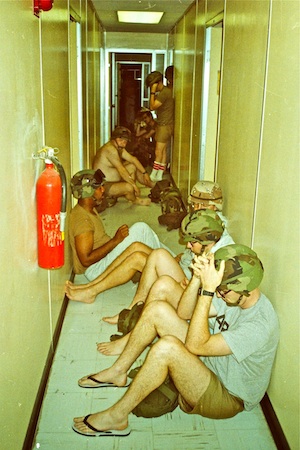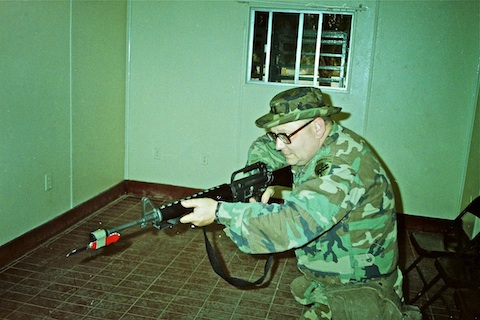Mission Assigned: Kuwait City
Jubayl, Saudi Arabia—Once in Jubayl, the company moved into its new home, named simply, Camp 1. In contrast to the more lavish apartments at Khobar Village, this place was only slightly more than one mile around the perimeter and the billets were “temporary” trailer-type modules with certain features that more than made up for the humbler setting: a nice dining facility; no long flights of stairs or slow elevators; and best of all, hot showers. Another feature the troops noticed: an abundance of trees. Moreover, once the troops realized what might be awaiting them in Kuwait City, Camp I acquired the aura of what MAJ Bob Dickson described as a Florida retirement center. Most unit members agreed with 1LT Dale Nellis about the virtues of Camp 1. Topping the list of virtues was Camp 3, where there was a recreation center providing a weight room, warm pool, and more members of the opposite sex¹.

The first few days at Camp 1 were less than spectacular. Common task training seemed to be aimed more at killing time than training troops. Towards the end of the week however, the tone changed considerably. Despite being rudely awakened at 0200 Saturday morning, February 16, by loud sirens announcing a SCUD alert, and a sonic boom that shook the area like a nearby hit, training became more meaningful. That day the unit received a briefing by the civil affairs section (G5) of the 352d CA Command which was an eye opener, and an encouragement.
Unit members learned the ground war might take as little as three to five days and that the processing of displaced civiilans would be quick in Kuwait City. Once again the troops were thinking in terms of a deployment of 180 days rather than one year. The days following that briefing however reverted back to the boredom usually attending relentless common task training; but once again toward the end of the week, the training improved.
For male troops the improvement was in more than class content. A young, charming Red Cross volunteer presented her personal description of events in Kuwait City following the Iraqi invasion. She had been there, since day one, and her experiences shed a whole new light on what life was like during the occupation, The 432nd got a first hand description of a brutal enemy and a heroic resistance movement.
The volunteer also explained how news releases by CNN enabled the Iraqis to pinpoint neighborhoods where Kuwaitis were sheltering Americans, and many Kuwaitis died as a result of that action².
McMurry’s Notes
- While we were in Camp 1, we were required to carry our weapons everywhere we went. However, we were not allowed to carry ammo, let alone have it locked and loaded. And this after the Marine compound up the street had been attacked by a drive-by shooting. We were constantly being told to be alert for other terrorist attacks. Keeping ammo unchambered in a garrison environment is a reasonable precaution, but not allowing the troops to carry any ammo at all was unconscionable. If we had been attacked, having no ammo would have made resistance impossible, but being armed would have made surrender difficult. As with the lack of radios, I know I wouldn’t have wanted to be the commander to have to explain to a family that their loved one had died because I had refused him the means to defend himself. Luckily, the advance party had been issued ammo at one point. SSG Anderson — to whom I will always be indebted — slipped me one of his spare 30-round magazines, which I kept hidden in my gas mask carrier the rest of our stay in Jubayl. If we were attacked, I wasn’t going down without a fight!

CPT Bill Bartleme with Swiss Army Knife bayonet. - There’s a special place in hell for Peter Arnett.
| Page 11 | Page 12 | Page 13 |
